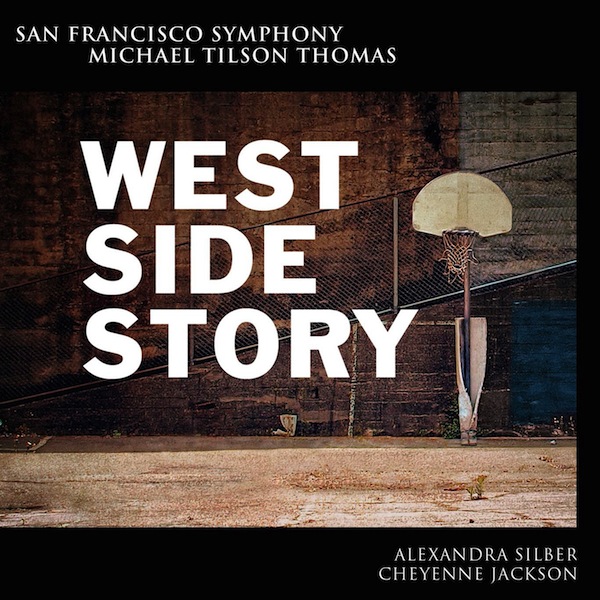
Michael Tilson Thomas: A West Side Story for the ages
By Sebastian Spreng, Visual Artist and Classical Music Writer
Just like the Romeo and Juliet on which it is based, a good performance of West Side Story should trigger a healthy cry-fest or at least some tearing up from the outset. As in the case of its illustrious elder sisters, Madame Butterfly and La Traviata, the underlying tragedy creeps in from the very first note, growing until the performance succeeds, not only as a musical, but as a fresco capable of capturing the most diverse and authentic of American urban operas. If that weren’t enough, there are the dances of their creator, Jerome Robbins, fundamental elements in the plot and the lyrics of a then-youngster by the name of Stephen Sondheim.
And this new superbly recorded live version from San Francisco’s Davies Symphony Hall, conducted by Michael Tilson Thomas, has all those: tears and dances, dances so contagious it’s easy to imagine him dancing on the podium, as Leonard Bernstein did during his studio recording, enraptured by the music’s irresistible rhythm.
In addition to conducting the original 1957 Broadway version with Max Groberman and the 1961 movie, Bernstein recorded a “grand” version with opera stars, perhaps to prove the operatic caliber of his work, which had been questioned by some critics. Employing Kiri Te Kanawa and Tatiana Troyanos was a treat for the veteran 66-year-old composer, as was featuring Marilyn Horne (replacing Jessye Norman) in Somewhere and a beautifully sung but language-challenged José Carreras. It was an extraordinary version, in the image and likeness of the ineffable Lenny, and therefore controversial.
Precisely three decades later, Michael Tilson Thomas has produced a West Side Story for the books. He has revitalized the score and rendered it perfectly. Just as Daniel Barenboim did with his recording of the Second Symphony of his idol, composer and conductor Wilhelm Furtwängler, MTT has managed to improve on Bernstein in more ways than one. It is not the first time he has done it, either. It’s impossible not to mention his memorable On the Town, another score that suffered unjustly at the hands of filmmakers before MTT successfully revived the show in London using a cast of giants (Hampson, Von Stade, Daly, Ramey, Hadley, etc.)
If at one point in time famous lyric sopranos like Dawn Upshaw and Barbara Hendricks were mentioned as possible Marias in complete album versions that never materialized (Barbara Bonney recorded one in 1993, and today you can’t help but imagine Audra McDonald in the role), MTT called on singing actors from the ranks of musical theater to lend his version the right stylistic balance. Here, the moving tenderness of the leading couple is powerful. Cheyenne Jackson is a winning Tony, and Alexandra Silber is even better as Maria. Hers is a brilliant performance (at times reminiscent of Kiri Te Kanawa’s vocal silkiness), especially in I Feel Pretty and I Have a Love, in which she faces off against Jessica Vosk’s fierce Anita in a belcanto Norma-Adalgisa mini-duo á la americane,though the memory of Tatiana Troyanos’ smoky opulence in Bernstein’s production still endures. But Silber and Vosk acquit themselves as the true creatures of the theater that they are, lending the work the stamp the conductor sought.
Adding to the winning recipe are an ideal Kevin Vortmann as Riff and Julia Bullock in a Somewhere that surpasses that of previous contenders, literally stealing the show. Both Gee, Officer Krupke and America shine as they should, with just the right humor and brashness. Another good idea: cut dialogue to a minimum, but render what remains respectfully and impeccably.
Who would have guessed that the 14-year-old boy who exchanged the record of West Side Story his parents had given him for Alban Berg’s Three Pieces for Orchestra would, half a century later, record the best version of Bernstein’s creation? Forty five years after that, the conductor gives us practically the entire score within a monumental sound framework, that of his San Francisco Orchestra. That orchestra comes off clear and glorious, just right, especially the percussion and brass, which practically set off sparks during the mambo. Supremely comfortable in this repertoire – you might say possessed by this music he carries in his soul and bones – MTT endows the most romantic aspect with the passionate elegance of the best Puccini – One Hand one Heart is gripping – and the urban moments with the purest jazz, neglecting no area, stressing its changing, capricious, multiple facets. Just as John McGlinn did with Showboat in 1987, MTT restores the show’s status as an American crown jewel and secures its place and validity in the international repertoire.
Though the record’s excellent presentation bears noting, it’s a good idea to plunge directly into the universe of these modern Capulets and Montagues and let yourself be moved by Bernstein’s music alone before reading MTT’s, Rita Moreno’s and Jamie Bernstein’s juicy, revealing essays, anecdotes and comments. And even if sentimental reasons make it difficult to do without its creator’s recording, this sensational version will from now on loom as the primary option.
* BERNSTEIN’S WEST SIDE STORY, MICHAEL TILSON THOMAS & THE SAN FRANCISCO ORCHESTRA, 2 CDs, 821936-0059-2
Recent Content
-
Artsarticle ·
-
Artsarticle ·
-
Artsarticle ·

